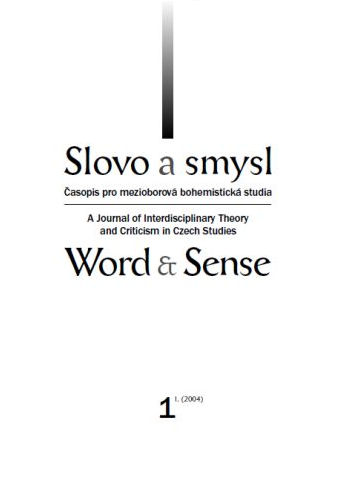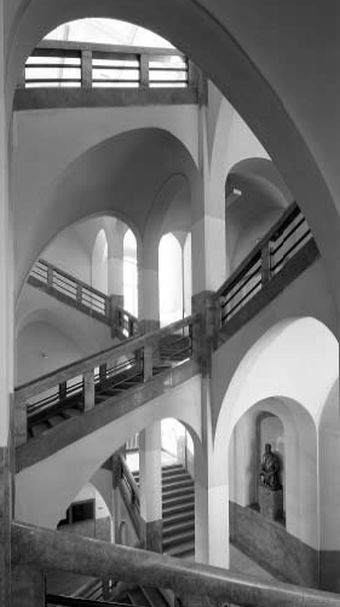Professing Literature in Prague: Re-Iterating Goals and Targets
PRAHA
The Department of Czech Literature and Literary Theory within the Faculty of Philosophy and Arts at Charles University, Prague, realizes its function: to serve as a natural center of Czech literary studies for both Czech and international scholars and students. During the 1990s, the Department devoted most of its time and energy to create and establish a new curriculum of teaching Czech literature. Instead of the traditional academic focus on literary history, rooted in positivistic “objectivism” and theories of social determination based on simplified versions of Marxism, the Department focused on the development of the legacy of Prague Structuralism of both 1930s and 1960s. Such a focus has naturally incorporated literary history but broadened the scope of academic interest toward literary theory and applied methods of literary criticism. Under Miroslav Procházka, the chair of the Department between 1993–1997, methodological approaches aimed also at contemporary semiotics, reader-response theories, hermeneutics, phenomenology etc. Under Miroslav Červenka (1997–2000), who succeeded Professor Procházka after his death, the focus upon theoretical issues further developed and the Department began to serve as a center of literary theory for other departments and academic research fields. The Department has broadened its focus on comparative issues, especially within Slavic, Central European, and Occidental contexts. Since the beginning of the new millennium, the Department has borrowed inspiration in Cultural Studies, leaving aside a strict philological divide. The Department still serves primarily for the five-year MA programme in Czech language and literature, which attracts around 120 new students per year. Next to that, the Department has almost 60 PhD students specializing either in the history of Czech literature, or in literary theory. Three-year BA programmes either in Czech language and literature, or just in Czech literature, are about to be established. Next to that, the Department goes on in the development of Czech Literature In and Out programme, intended for foreign students. They can spend one or two semesters taking classes that focus on Central European Modernism, Slavic Avant-garde, relationship between verbal and cinematographic narratives, ideology, gender studies, Milan Kundera, samizdat literature, nationalism, contemporary literary theory etc. This programme is taught by leading specialists from the University as well as other academic institutions and it began to attract attention of visiting professors from abroad; the first one to come was Professor Levitsky from Brown University.
Czech Literature In and Out programme, intended for foreign students, is probably the most obvious illustration of the changes of our academic policy. Besides offering high quality schooling to Czech students, the Department is aware of the need to serve as a base for international studies of Czech literature. Facing the decline of Slavic studies both in the United States and Western Europe, we strive to offer some substantial help to those who still stay in this academic field, be it schorals or students. Besides this programme, the Department offers access to the electronic version of both fundamental and rare texts of Czech literature: fiction, criticism, histories and dictionaries of Czech literature (visit http://cl.ff.cuni.cz, under přihlásit do systému, “požádejte o zřízení účtu”). In cooperation with The International Association of Teachers of Czech, the Department also works on mapping all the international university departments and courses that incorporate Czech literature. Other project aims at creating updated web databases of all texts of Czech literature translated into foreign languages (English, German, French, Spanish, Russian etc.).
Research activities of the Department are complex and diverse. Though there is no central focus where all the research activities of all the members of the Department would merge, some priorities are clear: fiction of Modernism after the turn of 19th and 20th centuries (including Prague German writers) and the notion of collective and personal identities [Petr Bílek, Jiří Holý], Czech Avant-garde including visual arts, architecture, and theory [Libuše Heczková, Josef Vojvodík, Jan Wiendl], history of 20th century Czech literary criticism [Michael Špirit, Petr Šrámek], concepts of literary history from the point of paradigms [Hana Šmahelová] and of contexts [Václav Vaněk], narrative patterns and strategies [Jiří Holý, Marie Mravcová], relationships of verbal and cinematographic narratives [Petr Málek, Marie Mravcová], contexts of old Czech literature [Jiří Hošna], theories of verse [Vladimír Binar, Miroslav Červenka, Markéta Kořená], hermeneutics and theories of reading [Jiří Holý, Jiří Trávníček], popular literature and culture [Petr Bílek, Pavel Janáček], gender theories [Libuše Heczková], literature of Christian faith [Jan Wiendl], literary images of the Holocaust [Libuše Heczková, Jiří Holý]. Naturally, these notions call for broader contextual perspectives, be it oriented toward contemporary theoretical discourses or toward religious, ethnical, or geographical contexts. Based on these research priorities, the Department has been able to join interdisciplinary and international projects established abroad (Narratological Project at University of Hamburg, Mass Media Project at University of Konstanz, Ballad as a Genre Project at University of Marburg, Totalitarian Literature Project at University of Vienna etc.).
Reflecting upon the teaching and research experience of the previous years, the Department is well aware of its “interpretative shift”. Instead of focusing on analysis and interpretation of some formerly forgotten manuscript or some biographical aspect, which would just add a new item into the assumed complex mosaic of “objective” literary history, most of the teaching and research activities of the Department of these days aim at theorization, at conclusions that would have some generalizable potential. It is obvious that literary texts and other entities of literary life can be treated as a material which is accessible for all the community and can be shared. Trough interpretation of such material one can draw some conclusions or statements about historical, political or cultural context of a specific geographical area, such as Czech lands; moreover, using such material, one can also draw conclusions and statements that test interpretative method or that raise issues of meaning, significance, sense, reference etc. The material of Czech literature offers some phenomena that are rather specific and that cannot be analyzed in other literary contexts: e. g. legacy of a multi-language tradition; the utilitarian approach to literature that is treated as a tool in national or social struggle; the experience of the two totalitarian eras and exposed processes of institutionalization of both literary texts and their contexts. Reflecting on that, we are neverthless well aware that Czech literature (however complex and difficult it might be to specify what such an umbrella term means) is one among the many. Czech literature happened to offer a number of entries into the international “cultural encyclopedia”: Comenius, Kafka, Hašek, Čapek, Hrabal, Havel, Kundera. That has happened to most of the “minor” literatures. That is why it makes no sense to promote Czech literature as something highly specific and unique. However, the obvious and strong interconnectedness of Czech literature and broader social discursive practices offers a specific field of studies where, through literary material, all the processes of meaning production as well as constraint can be studied. A relationship of literature with the coining of ideologies that goes hand in hand with aesthetization of politics is just one example.
The Department of Czech literature is aware that in recent years we do not produced just high school teachers and future scholars anymore. Some of our MA students decide for the Czech language and literature programme with no aim to become specialists. Schooling that focuses on the interpretative potentials of verbal materials just offers them a good training for future careers in real estates, commercial radios, PR agencies etc. As the virtual Czech genius, Jára Cimrman, says: one can disagree but that is all one can do about it. That is why we believe that broadening the exploratory focus on the international and interdisciplinary contexts turns out to be fruitful. The first issue of this journal is just the other illustration of such a decision.
Petr A. Bílek
Chair of the Department of Czech Literature


